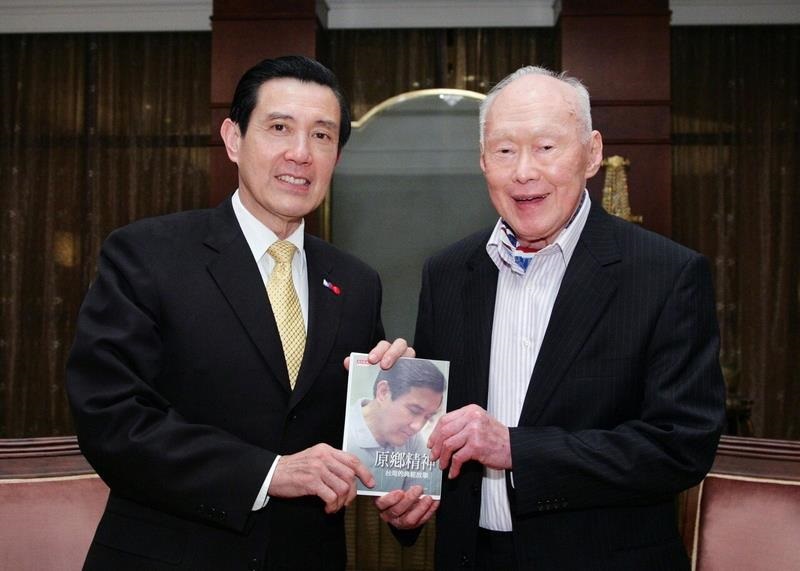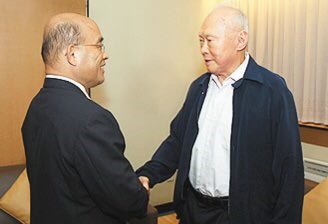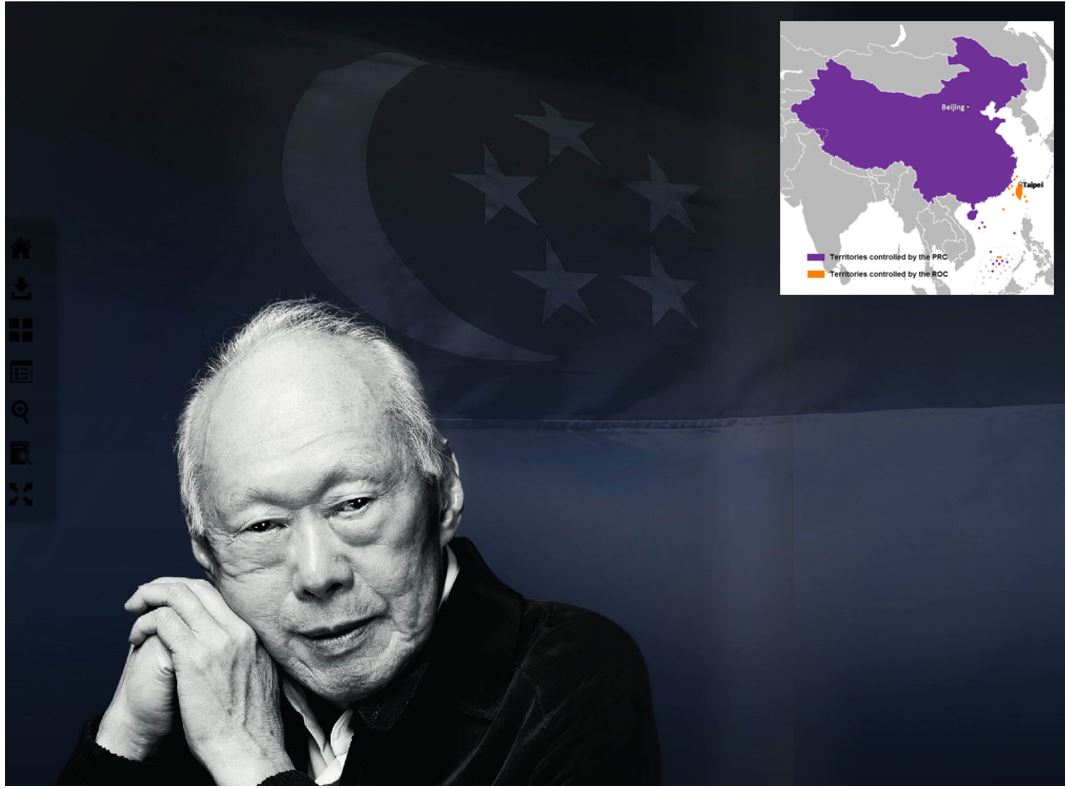A Straits Times commentary on Jan. 14 by a former Singapore journalist William Zheng advocated that Singapore should "follow (founding Prime Minister's) Lee Kuan Yew's example", arguing that Singapore's leaders need to show they draw a distinction between Taiwan's pro-independence and pro-unification camps, like what Lee (LKY) did, as Beijing's concerns over Taiwan trump its ties with Singapore.
It is perhaps unsurprising that as the Terrex issue between Singapore and Hong Kong rumbles on with no immediate solution in sight, this sense of nostalgia has become a discussion point to rationalise what had happened and to proffer the possible approaches on the way forward.
However, given the state of collective anxiety over Singapore-China relations, there is always the risk of applying reductive interpretations and harbouring misplaced hopes, as one uncritically appropriates the life experience of a towering figure in Singapore's history to support certain preconceived notions.
Here are three thoughts on why the politics of nostalgia could be a possible point for discussion, but not exactly the best approach.
1. Interpreting LKY's actions wrongly, for LKY never stopped engaging both sides in Taiwan politics.
For observers who are familiar with Singapore-China relations and also our long-standing ties with Taiwan, Zheng's argument is actually a curious piece of advice.
Throughout his political life, Lee has engaged both sides in Taiwan politics. In fact this is an approach that has been faithfully followed by our leaders even till today.
A cursory search online will have been sufficient to learn that he had received Taiwan visitors from both the pro-unification Kuomintang (KMT) and pro-independence Democratic Progressive Party (DPP) from time to time.
In fact, he had also visited Taiwan twice in his private capacity, in September 2000 and September 2002, when the island was then under the DPP administration.
He last went to Taiwan in March 2011 with his daughter, Lee Weiling, also on a private visit.
During his visit, he met with then Taiwan President Ma Ying-jeou from KMT and also DPP figures Tsai Ing-wen and Su Tseng-chang, who were competing in their party primaries for the ticket to stand in the 2012 presidential election. (Tsai went on to win the primaries but lost to Ma in 2012. She won the presidential election in Jan 2016 and become Taiwan's first female president).
 Source: Office of the President, Republic of China (Taiwan) website.
Source: Office of the President, Republic of China (Taiwan) website.
A reflection of LKY's deep ties with Taiwan can be seen after his passing.
Ma flew to Singapore specially to pay respects. Close friends from both KMT and DPP attended his funeral, including former Vice-Presidents Lien Chan and Vincent Siew, former Premier Hau Pei-Tsun and Su Tseng-Chang.
 Su met LKY in Singapore in May 2010. Source: LKY's office.
Su met LKY in Singapore in May 2010. Source: LKY's office.
2. Our consistency on the Terrex issue correlates directly with our survival as a small state.
It is day 56 since the Hong Kong Authorities detained the nine SAF Terrexes.
Without a doubt, countries around us are watching closely how the Terrex issue would play out, and Singapore will almost certainly be subjected to further tests by other larger countries should we back down on a key principle of our foreign policy -- the need to act independently based on our own national interests.
As what Ambassador-at-Large Chan Heng Chee wrote in "Small State Survival", a chapter in the book The Big Ideas of Lee Kuan Yew says:
"One essential principle Mr. Lee impressed on the region and the world is that Singapore, though a small country, cannot be pressured by bigger powers. He demonstrated this when Singapore stuck to its decision to execute two Indonesians (in 1968) despite Indonesia's leaning on us to stay the action. We demonstrated this again by standing up to US pressure in the case of American teenager Michael Fay who was caned (in 1994) for breaking the law in Singapore. "
Granted, a golden window of opportunity to resolve the issue discreetly and expeditiously last year was missed.
The sitting of our parliament in the new year meant that the Singapore government's position on the recovery of the Terexxes was bound to be questioned by our parliamentarians.
The "sovereign immunity" principle put forward by Defence Minister Ng Eng Hen was dismissed in some quarters as too legalistic and disregarded a Chinese cultural trait that viewed legal means as a last resort to resolve conflicts. According to this school of thought, this could well mean that positions on both sides are further entrenched, making the issue even more problematic.
This may be an accurate assessment of the Chinese psyche.
But for Singapore, much more is at stake than China's pride besides the detained Terrexes. It is about our survival as a small state.
3. The need to base our analysis on practical considerations (being pragmatic) rather than theoretical considerations (what will LKY do?)
Questions about whether Singapore can sustain its foreign policy balancing act between China and the United States are valid, but it is a tactical question.
As what Ambassador-at-Large Bilahari Kausikan wrote in "Playing Chess", a chapter also in the book The Big Ideas of Lee Kuan Yew,
"Diplomacy is not about being nice, polite or agreeable. It is more fundamentally about protecting and promoting the country's interests, preferably by being nice but if necessary by other appropriate means."
And pragmatism -- dealing with things sensibly and realistically in a way that is based on practical rather than theoretical considerations -- is a better approach than thinking about what LKY would do instead.
Bilahari recounted the 1968 execution of Indonesian marines as an example:
"1n 1968, Mr Lee turned down a direct appeal by then President Suharto to pardon two Indonesian marines who had been sentenced to death for planting a bomb during Konfrantasi (italics) that killed several Singaporeans. He could not have done otherwise without conceding that the small must always defer to the big and thereby irretrievably compromising our sovereignty...But a few years later, in 1973, Mr Lee did not shy away from placing flowers on the graves of the two marines.
Both actions -- standing firm on fundamental principle even at a risk of conflict and making a gracious gesture once the principle has been established -- were equally important in the setting the foundations of the relationship we today enjoy with Indonesia "
Learning from LKY: A question open to discussion
How would LKY handle the Terrex issue?
That may be a question open to discussion among academics and political observers. For instance, could his response have been more robust than the government's current approach? It is not entirely impossible, especially if LKY views the sovereignty of Terrex as a "core interest" issue for Singapore.
There is only one LKY and it is not possible to replicate his formidable strengths in many areas. For example, he was someone who knew the importance of personal relationships and he expanded Singapore's diplomatic space on the international stage with the force of his personality and intellect, cultivating a wide network of global contacts for the benefit of Singapore.
A specific example showed the length to which he will go to promote Singapore's interests. In May 2010, the then 86 year old LKY, who had planned to travel directly to the Shanghai World Expo, accepted an invitation from his old friend, former Chinese President Jiang Zemin. This meant that LKY had to re-arrange his schedule and visit Jiang in his home town Yangzhou.
Back to the Terrex issue, it is quite clear that acting on nostalgia-evoked inspiration based on an imagined concept of LKY's cross-strait relations approach is hardly a good course of action.
For someone as hardheaded as LKY, one can imagine his disapproval of overly sentimental Singaporeans longing for the past approach of doing things.
Our current leaders may not resemble LKY, but even LKY will have difficulty dealing with leaders from an emergent world power that he does not have strong relationships with.
And a Donald Trump era means that it is wiser to deal realistically with the cards we have now (our current leaders' relationship with Chinese leaders, our bilateral agreements, and the strength of our economy) than to wish wistfully for those cards (LKY and his relationship with Chinese leaders) we do not possess.
Top picture from www.rememberingleekuanyew.sg and Wikipedia
If you like what you read, follow us on Facebook and Twitter to get the latest updates.
If you like what you read, follow us on Facebook, Instagram, Twitter and Telegram to get the latest updates.
